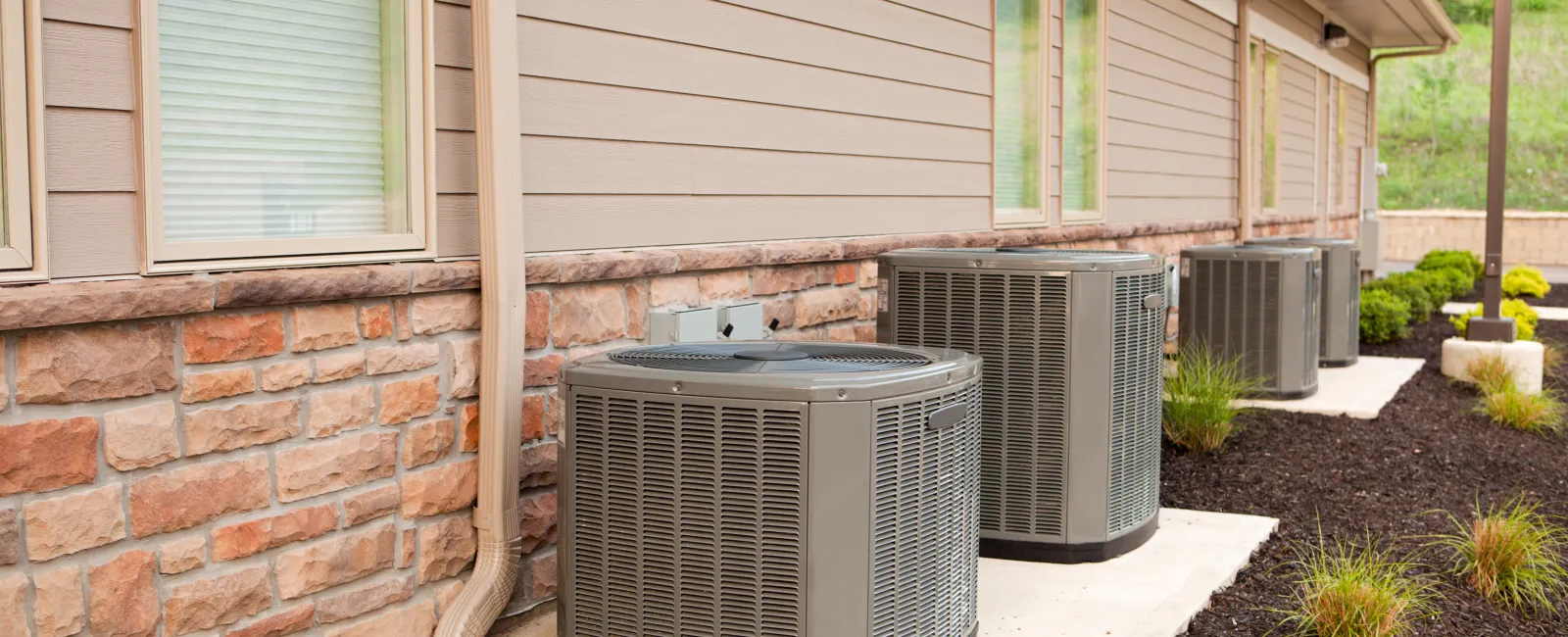March 27, 2025
Your AC may be leaking water due to a few common issues, such as a clogged condensate drain line, a damaged drain pan, or even a dirty air filter. These problems can cause water to back up, leading to water dripping from the AC indoor unit or water coming from the AC unit. Regular maintenance, like cleaning the drain line and replacing filters, can prevent these leaks. If you notice persistent AC leaks or water dripping from your AC unit, it's best to consult a professional HVAC technician to diagnose and resolve the issue.
Common Reasons Your AC Is Leaking Water
Your Condensate Drain Line Is Clogged
One of the most frequent reasons for water leaking from your AC unit is a clogged condensate drain line. As your air conditioner cools your home, it also pulls humidity from the air. This moisture condenses on the evaporator coil and drips into a drain pan, then flows outside through the drain line.
Over time, dust, mold, algae, or debris can block this line. When that happens, water backs up and spills out of the drain pan, which is why your AC unit may be dripping water inside your home.
The Drain Pan Is Rusted or Cracked
The drain pan beneath your indoor unit is designed to catch water before it's drained away. However, if your system is older, this pan can become rusted or cracked, allowing water to leak through. Even a small crack can cause significant water to leak, especially during the hot, humid months when your AC is working hardest.
The Air Filter Is Dirty or Clogged
You might not think of your air filter as a reason for an AC unit leaking water, but a dirty filter can actually lead to freezing on your evaporator coil. When the coil freezes and then melts, the excess water may overwhelm the drain system, resulting in water dripping from the AC indoor unit.
Replace your air filter every 1-3 months, especially during heavy usage seasons, to prevent blockages that lead to AC leaks.
Low Refrigerant Causes Coil Freezing
Low refrigerant levels can cause your evaporator coil to become too cold, leading it to freeze over. When the system shuts off or warms up, the ice melts and may cause water to come from your AC unit faster than the pan or drain line can handle. If you hear hissing or bubbling sounds or notice reduced cooling, low refrigerant could be to blame.
Improper Installation or Leveling
If your AC unit isn't properly leveled, water may pool and leak in directions it shouldn't. This is especially common in newer installations or DIY jobs where the indoor unit isn't sitting flat. An unlevel unit can cause water to spill out of the drain pan instead of draining properly, leading to your AC unit leaking water inside your home.
Symptoms of a Leaking AC Unit You Shouldn't Ignore
So, how do you know if your air conditioner is leaking water and not just condensation forming normally? Here are a few signs to look out for:
Puddles of water around the indoor unit
Water stains on ceilings or walls near your AC
Musty odors indicating mold or mildew growth
Dripping sounds from inside the unit
Your thermostat is set correctly, but the room still feels warm
These signs indicate that your AC leaking water is a recurring issue that should be addressed promptly to prevent further damage.
When to Call a Professional
While you can handle things like replacing a filter or checking for obvious obstructions in the drain line, it's best to call a licensed HVAC technician if the leak continues.
One of our experienced technicians at MR. HVAC will inspect your system for refrigerant issues, broken components, or deep clogs that need special tools to clear. They can also clean and flush your drain line to ensure long-term performance.
How to Fix an AC That's Leaking Water
Fortunately, many AC leaks are fixable. If you've spotted water coming from your AC unit, here are a few steps to try before calling a professional.
Step 1: Turn Off Your AC
First and foremost, turn off the power to your AC system. This prevents electrical hazards and gives the unit a chance to thaw if it's frozen.
Step 2: Check the Air Filter
Pull out your air filter and inspect it. If it looks clogged or dirty, replace it with a new one. This alone can stop many instances of an AC unit leaking water by restoring proper airflow.
Step 3: Locate and Clear the Drain Line
If you're comfortable doing so, you can try clearing the drain line. Look for a PVC pipe near your outdoor unit—that's your condensate line. Use a wet/dry vacuum to suck out debris from the end of the line. If water or gunk comes out, you likely just cleared the blockage causing the leak.
Step 4: Inspect the Drain Pan
Using a flashlight, look under the evaporator coil inside your unit for rust, cracks, or holes in the pan. If it's damaged, it may need to be replaced or temporarily patched to prevent more water from leaking inside your home.
Preventing Future AC Water Leaks
Regular maintenance is the best way to prevent leaks. Preventative steps include:
Changing the air filter monthly during summer
Scheduling seasonal HVAC inspections
Clearing the condensate drain line at least once per year
Making sure the unit is level and securely installed
Watching for early signs of refrigerant issues, like weak airflow or freezing
Preventive care keeps your system running efficiently and extends its life, while also protecting your home from damage caused by AC unit leaks.
Still Wondering Why Your AC Is Leaking Water?
To sum it up, the most common causes of an AC unit dripping water include clogged condensate lines, frozen coils, low refrigerant, and poor drainage due to installation or leveling issues. Understanding what's behind water leaking from your AC unit can help you take action early and avoid further damage or mold buildup.
Take the First Step Toward a Leak-Free Home
If you're currently dealing with an AC leaking water, don't wait until it causes bigger issues. Whether you're noticing water dripping from the indoor unit or persistent puddles near your system, a professional HVAC technician can diagnose the root cause and provide lasting solutions.
If your air conditioner is leaking, schedule a checkup with a trusted technician at MR. HVAC. Timely maintenance and a proactive approach can make all the difference between a small issue and a costly repair.




